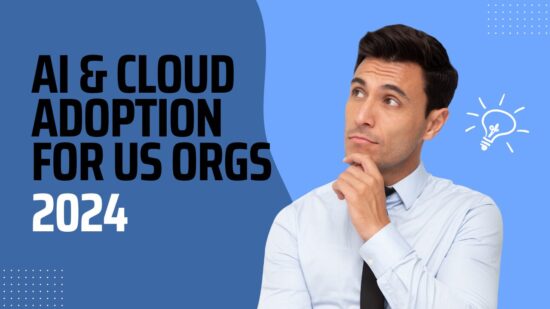AI and Cloud Computing in 2024: Key Innovations and Industry Impact
As we approach 2024, the ever-evolving landscape of technology presents us with the powerful convergence of artificial intelligence (AI) and cloud computing. This union offers numerous opportunities but raises concerns that merit careful attention and informed decisions. In this article, we will explore the symbiotic relationship between AI and cloud computing and their transformative impact on various industries and processes.
AI and cloud computing work together harmoniously, as the vast computational power of the cloud enables the development of cutting-edge AI algorithms. These AI-driven algorithms help shape cloud services, making them more efficient, secure, and tailored to specific needs. Moreover, advancements in AI technologies are being accelerated by cloud infrastructure’s vast resources and scalability, driving the growth of the AI and cloud computing markets.
However, ethical considerations of AI and the security challenges that accompany it need acknowledgment and addressing as we continue to integrate these technologies into our daily lives. Therefore, navigating this seemingly boundless landscape requires a delicate balance between innovation and responsible management.
Key Takeaways
- AI and cloud computing are converging to drive innovation across industries.
- Both technologies are mutually beneficial, with AI shaping cloud services and cloud infrastructure accelerating AI advancements.
- Ethical concerns and security challenges must be addressed to ensure responsible adoption and integration of AI and cloud technologies.
AI and Cloud Computing Convergence
As we move into 2024, the convergence of Artificial Intelligence (AI) and cloud computing has become more prominent. In this section, we will discuss the integration strategies being employed and the infrastructure innovations enabling this convergence.
Integration Strategies
AI has dramatically reshaped the cloud computing market, resulting in a strong push for integration. Key strategies we’ve seen in 2024 include:
- Hybrid cloud architectures: By combining public and private clouds, businesses can effectively balance scalability, security, and control. This allows organizations to run AI workloads efficiently, leveraging the strengths of their existing on-premises infrastructures and public cloud services.
- Platform-as-a-Service (PaaS): PaaS offerings are now available with built-in AI capabilities, simplifying the deployment of AI applications in the cloud. These cloud-based platforms handle infrastructure management, allowing users to focus on developing and running their AI applications.
Infrastructure Innovations
The surge in AI adoption has necessitated infrastructure innovations in the cloud computing landscape. To meet the demands of AI workloads, these important innovations have emerged:
- Specialized Hardware: Cloud service providers now offer accelerators, such as Graphics Processing Units (GPUs) and Tensor Processing Units (TPUs), specifically designed to deal with AI workloads.
- Scalable Storage Solutions: AI applications require storage that can scale seamlessly to accommodate large amounts of data. Cloud service providers now offer flexible storage systems that can adapt to changing needs.
- Serverless Computing: As AI workloads grow in complexity and scale, cloud providers have implemented serverless computing, allowing users to run AI workloads without worrying about infrastructure management. Companies can focus on refining their AI algorithms while the cloud provider handles the backend.
AI-Driven Cloud Services
As we move into 2024, the landscape of cloud computing is undergoing a significant transformation, thanks in part to the ongoing integration of artificial intelligence (AI) and machine learning (ML) technologies. This section will explore two critical aspects of AI-driven cloud services: Machine Learning Platforms and AI Software-as-a-Service (SaaS) Offerings.
Machine Learning Platforms
Machine learning platforms are increasingly pivotal in cloud computing, optimizing resource management and enabling organizations to create and deploy advanced analytics models. Some critical aspects of these platforms include:
- AI-optimized Infrastructure: Innovative technologies, such as GPUs and custom AI chips, are boosting the performance and efficiency of cloud-based ML workloads.
- Auto-scaling: This feature enables dynamic management of resources based on capacity demands, with AI algorithms helping to enhance efficiency and reduce complexity in cloud operations.
- Multimodal AI functionality: Integrating AI models capable of processing and understanding different data types (e.g., text, images, and video) provides organizations with a more unified and powerful analytics capability.
AI SaaS Offerings
AI-driven SaaS solutions in the cloud have revolutionized various industries by providing businesses with easy access to sophisticated AI tools and applications. Here are a few examples of AI SaaS offerings in the market today:
- Natural Language Processing: Businesses leverage NLP-based tools to understand and process customer interactions, sentiment analysis, and content generation, enhancing customer experience and streamlining communication workflows.
- Predictive Analytics: Cloud-based AI-driven tools allow businesses to harness the power of analytics for forecasting sales, managing inventory, and optimizing marketing efforts.
- Virtual Agents: AI-integrated cloud services enable companies to deploy powerful virtual agents for customer service, assisting clients 24/7 while reducing operational costs.
Cloud-Enabled AI Applications
As we move into 2024, cloud computing continues to evolve and develop. One area that sees rapid advancements is AI-powered, cloud-enabled applications. These applications leverage the cloud’s storage and processing capabilities to deliver smarter, faster, and more accurate services. This section will explore two essential categories: Smart Analytics and Autonomous Systems.
Smart Analytics
Smart Analytics solutions combine real-time data with advanced AI algorithms to drive better decision-making processes. These analytics tools help organizations extract valuable insights and actionable information from their data. The primary focus today is on:
- Multimodal Databases: As businesses continue to use AI-powered applications in various domains, Multimodal databases experience significant growth and investments. The result is seamless integration of data from different sources and formats.
- Edge AI: The convergence of AI and edge computing brings robust real-time analytics and decision-making capabilities. These developments enable faster processing and real-time inferencing close to the data source, reducing latency and increasing overall efficiency.
- Model Optimization: Cloud-based AI services offer more sophisticated model optimizations, improving performance while lowering energy consumption. These advancements make AI more accessible and efficient for small and large-scale operations.
Autonomous Systems
Another area in which AI-powered cloud computing applications excel is autonomous systems. These systems leverage AI to operate without human intervention and perform various tasks effectively. Some noteworthy developments in this domain include:
- Intelligent Robotics: Cloud-based AI services aid in streamlining data flow in robotics, from sensing and processing to actuation. These technological advancements result in autonomous robots with enhanced capabilities like object recognition, navigation, and decision-making.
- Advanced Virtual Agents: The integration of AI and cloud computing has led to the development of more powerful virtual agents. Using natural language processing, these agents can engage users in complex interactions and respond to various queries more effectively than before.
- Driverless Transportation: Cloud-based AI services are setting the stage for driverless transportation by optimizing routing, managing traffic flow, and improving the decision-making mechanisms of autonomous vehicles.
Advancements in AI Technologies
In recent years, artificial intelligence (AI) has experienced significant advancements that continue to propel the technology forward in 2024. This section will discuss two main areas of AI improvements: deep learning and natural language processing.
Deep Learning Improvements
Deep learning has undergone numerous enhancements, leading to better performance and accessibility. Key advancements include:
- GPU Shortages and Cloud Costs: As demand for AI models increases, GPUs have been in a shortage. However, providers are working hard to ensure that cloud-based platforms are more accessible and cost-effective for developers to access GPU resources and utilize AI toolsets.
- Model Optimization: The AI landscape now focuses more on model optimization. With more accessible tools and techniques, developers can create efficient AI models that maintain accuracy while reducing the required computational resources.
- Customized Local Models and Data Pipelines: We are witnessing a rise in customized local models to suit specific needs. These localized models allow organizations to optimize data processing and deployment pipelines, leading to better performance and ease of use.
Natural Language Processing Enhancements
Natural language processing (NLP) has become essential to AI-driven applications. Here, we highlight three significant NLP advancements:
- Small(er) Language Models and Open-Source Advancements: As more developers collaborate and contribute to open-source NLP projects, smaller language models have become available with increased accuracy and effectiveness. This has led to higher adoption of NLP techniques in various applications.
- Reality Check: More Realistic Expectations: The hype surrounding AI technologies and their capabilities has diminished as developers understand the limitations. We now see a more pragmatic approach to implementing NLP technologies, with a better understanding of real-world constraints.
- Multimodal AI: Integrating NLP with other AI modalities (such as computer vision) has led to the rise of multimodal AI systems. These systems allow for more seamless communication between humans and machines, extending the understanding and context of user interactions.
Cloud Security and AI
Threat Detection
In 2024, AI-driven attacks have surged, and as a response, we are observing a rapid innovation in AI-based security measures. Generative AI security use cases and solutions provide enhanced capabilities in detecting and responding to an ever-evolving array of cyber threats. Combining AI and cloud computing has emerged as a powerful force in bolstering cybersecurity, particularly in threat detection and data privacy.
One critical development has been migrating legacy to modern SIEM systems incorporating advanced AI technologies. These new systems offer better threat detection and alert analysis, thanks to AI algorithms and machine learning techniques that can identify patterns and anomalies in large datasets4.
Data Privacy
As more organizations embrace cloud computing and AI, ensuring data privacy remains crucial to security. While AI can enhance security, it can raise ethical concerns, such as dual-use technology and skill gaps1.
To manage these risks and protect sensitive information, we have adopted some best practices:
- We are implementing role-based access control to prevent unauthorized access to sensitive data.
- We are utilizing quantum computing with AI to develop more robust encryption methods.
- We continuously update AI algorithms to address emerging threats and learn from false positives.
- We ensure compliance with data protection regulations, such as the General Data Protection Regulation (GDPR).
We remain vigilant in safeguarding data privacy in cloud computing while leveraging AI for enhanced threat detection and mitigation.
AI and Cloud Computing Markets
Industry Growth Trends
We have observed significant growth in the cloud artificial intelligence (AI) market in recent years. In 2022, the global cloud AI market was valued at USD 44.97 billion and is projected to grow at a compound annual growth rate (CAGR) of 39.6% from 2023 to 2030. This rapid growth can be attributed to the increasing demand for faster processing, improved efficiency, and cost savings provided by combining cloud computing and AI algorithms.
Integrating AI technologies across various sectors is anticipated to further shape the cloud computing market landscape. In fact, by 2024, a cloud-driven industry will be characterized by the widespread adoption of AI. Emerging sectors that leverage cloud AI solutions include:
- Banking, Financial Services, and Insurance (BFSI)
- Healthcare
- Automotive
- Retail
- Government
- Education
Emerging Market Players
As the AI and cloud computing markets continue to evolve, we can expect to witness the rise of new market players. These innovative companies will likely focus on offering advanced AI algorithms and cutting-edge cloud solutions designed to address the specific needs of various industries. Some of the key trends that we should be on the lookout for in the coming years include:
- AIaaS (Artificial Intelligence as a Service): As AI adoption rises, companies may begin offering AI algorithms and services through subscription-based models.
- Edge AI and Cloud Integration: With the growing need for real-time AI processing, we might see more solutions that combine edge AI and cloud computing to deliver faster decision-making processes.
- AI-driven Security and Compliance: AI can potentially enhance cloud computing data security and regulatory compliance. Companies focusing on these aspects may have a competitive edge in the market.
- Collaborations and Mergers: Smaller companies with specialized AI and cloud capabilities may collaborate with or be acquired by larger tech corporations to create more robust offerings and meet growing customer demands.
Ethical Considerations of AI
As we explore the implications of AI and cloud computing in 2024, we must not forget to address the various ethical considerations in this rapidly evolving field. This section will cover some of these considerations, focusing on Bias Fairness Regulation and Governance.
Bias and Fairness
One of the central concerns in AI and cloud computing is the existence of biases within AI algorithms. These biases can result in unfair and inaccurate outcomes that may negatively affect marginalized groups or perpetuate harmful stereotypes. To address this, we must:
- Ensure transparency and explainability: Providing clear explanations of AI algorithms and their decision-making processes will help users understand how bias may be introduced and how to mitigate it.
- Anticipate and mitigate bias: We must proactively monitor and assess AI systems for potential biases and develop methods to reduce or eliminate these biases promptly.
- Privacy-preserving AI: Protecting sensitive user information and preventing potential data misuse that could lead to biased AI outcomes is critical. Techniques such as differential privacy can help achieve this without sacrificing the performance of AI algorithms.
Regulation and Governance
Another aspect of ethical AI involves establishing appropriate regulations and governance mechanisms that ensure AI systems’ responsible use and development. To achieve this, we can take the following steps:
- Define ethical guidelines and best practices: Developing guidelines and best practices will help organizations navigate AI’s complex moral landscape and ensure responsible AI systems’ development.
- Develop regulatory oversight: We must advocate for establishing regulatory bodies that provide oversight and enforce ethical standards in AI development and deployment. This will help ensure AI systems are held accountable for their actions.
- Promote AI education: We should foster a culture of continuous learning and ethical awareness by providing training programs on ethical AI practices for employees involved in AI development and deployment.
Future Directions
As we head into 2024, the landscape of AI and cloud computing has undergone significant transformations. In this section, we will explore two key areas that have shaped the industry and are set to continue influencing its future: Predictive Analytics and the Influence of Quantum Computing.
Predictive Analytics
AI integration with cloud computing has created an era of faster, more accurate decision-making using predictive analytics. This powerful duo of AI and the cloud offers several benefits that are crucial for today’s business landscape:
- Efficient data processing: With the vast amounts of data businesses generate, AI-powered predictive analytics on cloud platforms allow us to process and analyze this data faster.
- Improved decision-making: As AI algorithms become more sophisticated, we can predict future trends and demands more accurately, enabling companies to make informed decisions to stay competitive.
- Cost-effective solutions: Cloud computing makes AI technology accessible to organizations of various sizes, and it has resulted in cost-effective and agile solutions by improving infrastructure provisioning and reducing hardware expenses.
The following table highlights some notable sectors utilizing predictive analytics:
| Industry | Application |
|---|---|
| Healthcare | Disease detection and prevention |
| Finance | Risk management and customer analysis |
| Manufacturing | Supply chain management |
| Retail | Customer preferences and marketing |
Quantum Computing Influence
Quantum computing has the potential to revolutionize AI and cloud computing. The immense computational power of quantum computers can significantly reduce the time required to process complex algorithms. Here are some ways quantum computing is expected to impact the future of AI and cloud computing heavily:
- Speeding up machine learning algorithms: Quantum computing could enable us to develop new machine learning models by exponentially accelerating the training process. This, in turn, would allow us to tackle complex problems that were previously impossible.
- Enhancing data security in the cloud: With quantum computing’s unique encryption capabilities, we could witness a new level of security in cloud computing, ensuring better protection of sensitive information and strengthening data privacy.
How BACS Consulting Group Enable Organizations Across The United States To Adopt Cloud & AI Technologies
At BACS Consulting Group, we continually evolve to stay ahead of the technology curve, ensuring our clients can leverage the best and most relevant solutions for their needs. Our expertise in cutting-edge technologies such as artificial intelligence (AI) and cloud computing has helped organizations across the United States transform their businesses and gain a competitive edge.
Partnering for Success
Together, we assess our client’s goals, priorities, and challenges and devise strategic plans to integrate and optimize AI and cloud computing. We consider various factors, such as size, resources, and goals, to tailor the best technology solutions for different organizations.
Our services include:
- Cloud Computing: We help businesses transition to cloud-based technologies while minimizing costs and maximizing efficiency. Working with multiple cloud platforms, we can strategically determine each organization’s best solution.
- AI and Machine Learning: We enable our clients to harness the power of AI, assisting them in implementing sophisticated machine learning algorithms to drive better insights, automate processes, and improve decision-making.
Empowering Small and Medium-Sized Enterprises
In recent years, there has been a paradigm shift in emphasis from data management to converting data into actionable information. This revolution has made advanced business analytics more widely available to small and medium-sized enterprises (SMEs) at an affordable cost. BACS Consulting Group actively supports SMEs, providing them with the tools to analyze data and drive better business outcomes rapidly.
Consistently Delivering Quality and Building Trust
We maintain an unwavering commitment to service quality throughout our partnership with clients. Our dedication to understanding the nuances of each business and catering to their unique requirements has helped build lasting relationships founded upon trust, satisfaction, and mutual success.








